Gandhi 3.0: Grand Rehearsal Of Unconditional Love
“The men who discovered for us the Law of Love were greater scientists than any of our modern scientists. Only our explorations have not gone far enough, and so it is not possible for everyone to see all its workings. Such, at any rate, is the hallucination, if it is one, under which I am labouring. The more I work at this Law, the more I feel the delight in life, the delight in the scheme of this universe. It gives me a peace and meaning of the mysteries of Nature that I have no power to describe.” -- Gandhi
In the heart of Gandhi’s homeland, there is a modern-day experiment of the timeless Law of Love. They call it Gandhi 3.0, where "Gandhi" stands for the age-old principle of leading with inner transformation, and "3.0" represents the many-to-many networks that are popularized by Internet.
In January 2018, around the 100th anniversary of the Gandhi Ashram, the experiment culminated in a global retreat, the third of its kind since 2014.
It is an unspeakable experience. "It is difficult, very difficult to find words to express all that we've lived in Ahmedabad," wrote Vasco Gaspar from Portugal, who authored the first book in Portuguese on mindfulness. "When people ask me how it was, I just stay silent, let my eyes and smile shine, bless them in my heart and give them a big hug. :) All words seem to dilute the sacredness of the experience… Feel touched at a deeper part of my being... Although in the last years I've been fortunate to experience several "cutting-edge" retreats and programs and also to work closely with some of the most inspiring organizations, this experience you gave us showed me a higher level in terms of what is possible regarding human connection and loving-kindness. I feel blessed and resonate with Ujwal Thakar's words, 'God must exist and I must be in his good books -- how else could I have been at this retreat?'"
It is an unusual invitation: Travel across globe to spend a week with 70 changemakers whom you have never met. No agenda. No desired outcomes. No price tag. For many invitees, our minds never figured out how we said yes. Yet, from the very first moment, our hearts knew we had to be here. One participant wrote after the retreat, "I went with some skepticism, not sure this was for me. But I was moved over and over, by the people, their generosity of spirit, the deep truths we shared, the love. I am eager to see how I might take this forward into my life and work."
It is an unlikely constellation of participants: Forty participants and thirty volunteers, from over a dozen countries, speaking over a dozen languages. Their ages range from 23 to 82, while their spiritual lineages cover almost the entire divine spectrum. Professionally, we only need a dentist and a blacksmith to start our own town. At any given time, we see a Japanese spiritual leader sitting next to a Hawaiian elder and martial arts master. A founder of business school having chai with a young Sufi. A former CEO of a multi-billion company taking a walk with Nobel Peace laureate. A Himalayan yogi chopping potatoes with a Israeli peacemaker. A senior Western Buddhist nun admiring the creativity of a Nepalese artist. Founders of massive NGOs tearing up at the stories of a former submarine commander… As one participant puts it, "This is the most diverse group of people I've been with."
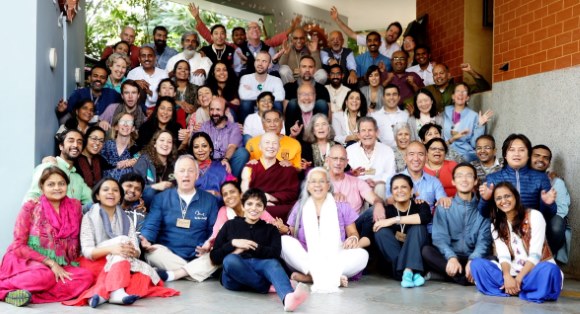
It is an unexpected outcome. The volunteers are singularly committed to practice unconditional love without any attachment to results. We knew in theory that the giving itself is the reward, but as the days unfold, it's hard to discern who's giving and who's receiving -- when material given and immaterial received indefinitely blurs such a distinction. Across the board, what seems to have emerged -- as many have noted explicitly -- is nothing short of life-changing. And this sophisticated group is not prone to exaggeration nor easily wowed.
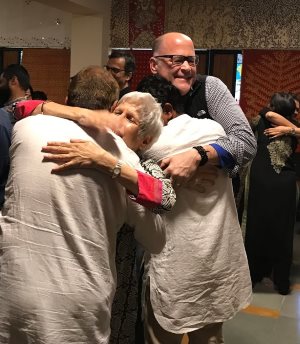 A businessman who ran retail banks and then the largest NGO in India posted on Facebook: "I have been in many gatherings of business people, intellectuals, non profit leaders, politicians, academics nationally and internationally ... but never experienced such pure concern for the future of the individual and humanity. It is undoubtedly the highlight of the sixty seven years of my existence." An accomplished professor reflected: "I came to the Gandhian Oasis, and it wasn’t a mirage. It nourished and reignited my soul in service to humanity. So much to deepen and explore after this experience of rejuvenation. I too am gulpingly inspired by the radically kind volunteers and light warriors I met in this my first trip to India. It took 54 years to be welcomed home. It has cracked my outer coconut shell." A Buddhist nun of 40 years remarked: "I've been looking for this for 20 years! No words for the wonders of Gandhi 3.0; we need to do this with our nuns." Founder of an innovative business school, wrote, "A million thanks to you for the five best days of my life!" A best-selling author from Canada, who got sick during part of the retreat, commented, "I feel like I've got 30 mothers taking care of me." A Pakistani project initiator candidly said, "If I don't get up tomorrow morning, it will be fine because I've now seen heaven."
A businessman who ran retail banks and then the largest NGO in India posted on Facebook: "I have been in many gatherings of business people, intellectuals, non profit leaders, politicians, academics nationally and internationally ... but never experienced such pure concern for the future of the individual and humanity. It is undoubtedly the highlight of the sixty seven years of my existence." An accomplished professor reflected: "I came to the Gandhian Oasis, and it wasn’t a mirage. It nourished and reignited my soul in service to humanity. So much to deepen and explore after this experience of rejuvenation. I too am gulpingly inspired by the radically kind volunteers and light warriors I met in this my first trip to India. It took 54 years to be welcomed home. It has cracked my outer coconut shell." A Buddhist nun of 40 years remarked: "I've been looking for this for 20 years! No words for the wonders of Gandhi 3.0; we need to do this with our nuns." Founder of an innovative business school, wrote, "A million thanks to you for the five best days of my life!" A best-selling author from Canada, who got sick during part of the retreat, commented, "I feel like I've got 30 mothers taking care of me." A Pakistani project initiator candidly said, "If I don't get up tomorrow morning, it will be fine because I've now seen heaven."
It is a rather simple plan. Build a field of deep ties, amplify trust and serve the emergence. Or as we say in ServiceSpace parlance, "do nothing" -- do a lot of homework upfront, tune into the dynamic interconnections within the network, and skilfully nudge the whole in alignment with the emerging collective intelligence. Volunteers not only had Plan B, C, and D up their sleeves, but a complete surrender to spontaneity. The team of dedicated volunteers did not intend for any of this to "happen". Our hypothesis is a simple one: if diverse people can all hold space with a focus on inner transformation, something may shift in the matrix of our inter-connection and create a field for radically innovative solutions for today's challenges.
Or as Myron Eshowsky shared after the retreat, “On the flight home, I kept coming to a quote in my mind from the Jewish scholar Maimonides who said, ‘Hope is belief in the plausibility of the possible as opposed to the necessity of the probable’. What is plausibly possible has shifted immensely in my mind since our time together by the beautiful experiences of service in action. The dream of the possible has expanded.”
CULTIVATING THE FIELD OF COMPASSION
The many invisible architects designed the retreat with a simple practice -- do small acts of love, with no strings attached. Such a field of generosity allows relationship to go deeper. Trust naturally arises. And in the presence of this trust, synergy happens, solutions emerge, and possibilities expand. Just as quality of fruits is directly proportional to the quality of the soil in which they grow, the quality of social emergence is directly proportional to the strength of ties in its network.
Invitations itself embodied this design principle. If you asked any guest exactly why they were coming, no one could give you an answer. That's because there was no answer. That meant that you would fly across the world only if you had trust in the person inviting you, and in the values that framed the invitation. It started with that trust.
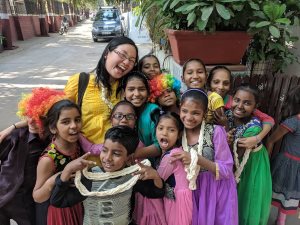 The central inquiry for "Gandhi 3.0" roughly translates to: "Can we build many-to-many networks that lead with inner transformation?" Many-to-many networks are easy to understand. A network of 50 people on Whatsapp is dramatically stronger than a room full of 50 people watching television. But how do we ensure that such communities nurture inner transformation? That first requires us to unpack what "inner transformation" is. Just as we work towards external change in society, it is inner transformation within an individual that brings us closer to our true nature of compassion. We have seen ample many-to-many organizations and movements in the direction of profit and protest, but we haven't seen it for compassion. And the reason why that matters is because love is a much stronger bond than anger or greed. This was the very foundation of Gandhi's movement, and his exemplary model of social change.
The central inquiry for "Gandhi 3.0" roughly translates to: "Can we build many-to-many networks that lead with inner transformation?" Many-to-many networks are easy to understand. A network of 50 people on Whatsapp is dramatically stronger than a room full of 50 people watching television. But how do we ensure that such communities nurture inner transformation? That first requires us to unpack what "inner transformation" is. Just as we work towards external change in society, it is inner transformation within an individual that brings us closer to our true nature of compassion. We have seen ample many-to-many organizations and movements in the direction of profit and protest, but we haven't seen it for compassion. And the reason why that matters is because love is a much stronger bond than anger or greed. This was the very foundation of Gandhi's movement, and his exemplary model of social change.
All the people who attended this retreat, then, said yes to an exploration of such compassion in a modern context. Such an inquiry is quite a radical one, because it requires us to fundamentally shift our organizing principle -- from manufacturing to gardening. In a time when all our innovative technologies are biased towards mechanistic, replicable, and scalable processes of a factory-based model, we are losing connection with value that is dynamic, contextual and emergent. Value like compassion. Cultivating compassion requires gardeners who plant seeds in fertile soil, expose it to the sun, water it daily, and then trust that, in due time, a shrub will sprout, build deep roots, and eventually a mighty tree will offer its fruits freely. That radical shift is what all of us had, consciously or subconsciously, resonated with.
As the lyrics to Nimo's Planting Seeds reads, "Whatever grows will grow, whatever dies will die, whatever works will work, whatever flies will fly, whatever fails will fail, what's meant to soar will soar. I am planting seeds, nothing more."
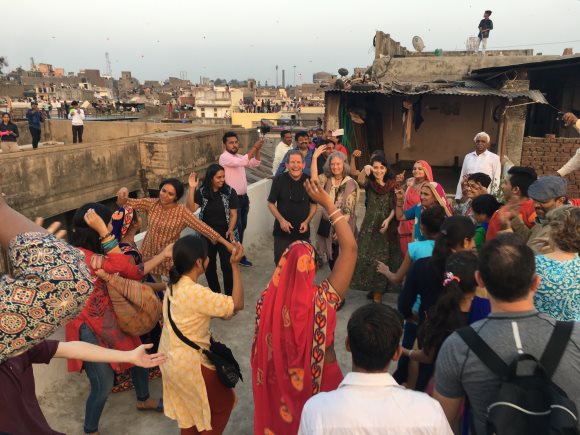
PLANTING SEEDS, WITH SINCERE INTENT
We started with "immersions" for five days leading up to the retreat. Volunteers had prepared an unending feast of local immersions for guests who had started to trickle into town: visit to local villages, trips to historical sites, meeting with wise elders, touring Gandhi Ashram and surrounding campuses, participating in the annual kite festival, Awakin Circle at Meghna’s home, trying our hands at traditional crafts, enjoying a night of generosity and laughter at Seva Café and so much more.
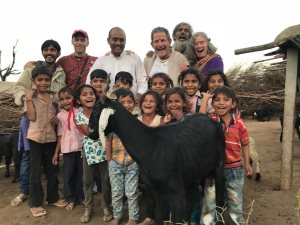 At the annual kite festival, on January 14th, our group of fifty hit the rooftops of a volunteer home in the "old city". Before long, they're fearlessly roof hopping, dancing and dining with strangers! Seeing an injured street vendor, Jayeshbhai appreciated his commitment to work for his family even when he's hurt. Gary Zukav asked to buy a packet of socks, just to support him, to which the vendor flatly responds, "No money" -- just to express his gratitude for their concern. It might've been his entire profit for the day. At a Qawwali, one evening, Aslinur Akdeniz from Turkey was spontaneously invited to lead an Arabic prayer in front of an audience of many hundreds. As the only woman on stage with twenty some other men, the honoring of the divine feminine was electric. Ven. Karma Lekshe Tsomo was especially moved, recognizing that Aslinur, as a young Muslim woman, was doing the same work which she has devoted her life to in Buddhism. Our last immersion evening, honoring "invisible service", opened by presencing someone who wasn’t there in person but very much in spirit -- Audrey! Except, lo and behold, she surprised everyone by flying in last minute and appeared from behind the door! Truly, a moment of great squeels, exuberant hugs, and unbridled joy for all the volunteers.
At the annual kite festival, on January 14th, our group of fifty hit the rooftops of a volunteer home in the "old city". Before long, they're fearlessly roof hopping, dancing and dining with strangers! Seeing an injured street vendor, Jayeshbhai appreciated his commitment to work for his family even when he's hurt. Gary Zukav asked to buy a packet of socks, just to support him, to which the vendor flatly responds, "No money" -- just to express his gratitude for their concern. It might've been his entire profit for the day. At a Qawwali, one evening, Aslinur Akdeniz from Turkey was spontaneously invited to lead an Arabic prayer in front of an audience of many hundreds. As the only woman on stage with twenty some other men, the honoring of the divine feminine was electric. Ven. Karma Lekshe Tsomo was especially moved, recognizing that Aslinur, as a young Muslim woman, was doing the same work which she has devoted her life to in Buddhism. Our last immersion evening, honoring "invisible service", opened by presencing someone who wasn’t there in person but very much in spirit -- Audrey! Except, lo and behold, she surprised everyone by flying in last minute and appeared from behind the door! Truly, a moment of great squeels, exuberant hugs, and unbridled joy for all the volunteers.
Immersion didn't just mean going out. For some, it meant going deep within. For Uncle Bruce and Aunty Kehau, spiritual elders from Hawaii, this was their first visit to India. In her first waking moment, Aunty Kehau spots a lizard and starts praying. “For us, that’s where our lineage starts, and it’s quite auspicious that our ancestors are here.” Moments later, nine eagles hover over her in the sky. She starts tearing. “Our ancestors are blessing our arrival here.” Everyday, both of them would wake up and greet every tree on campus.
By the first morning of our retreat, our media team had already crafted this video of our immersion (click on full-screen for optimal effect :)) ...
Various folks would return from immersions and call it "one of the happiest days of my life." Later, Gary described it as, "Heart expanding, mind expanding, life changing. I am crying with gratitude and shouting with joy."
TILLING THE SOIL, WITH OUR QUESTIONS
As a design principle of the retreat, we emphasized the questions we were living into, over the answers we might’ve accumulated in the past. Coming together in the spirit of not knowing, as beginners, feels a lot stronger than coming together as experts.
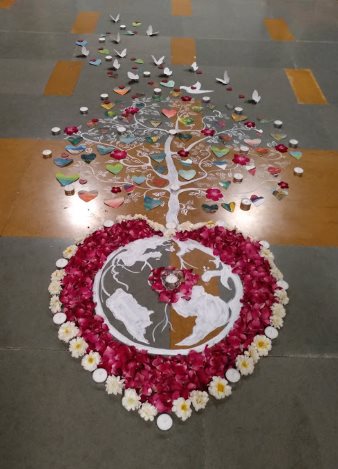 For our first circle, right after peacocks magically appeared to bless our opening ceremony, we invited the question: “What is one gift from your lineage that you are grateful for?” As the 70 souls in the room took turn to offer the treasure from their lineage -- be it ancestral, spiritual, or communal -- the room got filled to the brim with the true inheritances of a thousand generations: generosity, joy, truthfulness, freedom, humor, resilience… Sometimes, the gifts are also not always evident or pleasant -- a gift in disguise, coming down to us as intergenerational pains, offering us the opportunity to engage in genetic alchemy, transforming suffering into wisdom, brokenness into healing.
For our first circle, right after peacocks magically appeared to bless our opening ceremony, we invited the question: “What is one gift from your lineage that you are grateful for?” As the 70 souls in the room took turn to offer the treasure from their lineage -- be it ancestral, spiritual, or communal -- the room got filled to the brim with the true inheritances of a thousand generations: generosity, joy, truthfulness, freedom, humor, resilience… Sometimes, the gifts are also not always evident or pleasant -- a gift in disguise, coming down to us as intergenerational pains, offering us the opportunity to engage in genetic alchemy, transforming suffering into wisdom, brokenness into healing.
In the next morning’s opening presentation, Nipun Mehta and a crew of 7 volunteers gave an initial download of the 7 questions that ServiceSpace was holding.
1. Can we design for impermanence? Despite being a leader of the country, with many adversaries, Gandhi refused to get personal security -- why wasn’t he afraid? If technologies of permanence, like money, bias us towards accumulating, what systems could inspire us to give, flow and build relationships along the way?
2. Can we cultivate an untiring mind? Why didn’t Gandhi burnout even after working for 18 hours a day, for 40 years? Prior to the Salt March, 78 people practiced untiringly for 15 years. If every moment becomes a destination, can our embrace of the present regenerate us continually?
3. Can we embrace imperfection? In his own autobiography, Gandhi outlines his radical “experiments with truth” and his many repeated failures. Like the Japanese practice of Kintsugi, where a broken bowl repaired with golden filling is more valuable than the “perfect” one, can we free ourselves from personal and collective delusions of perfection?
In the“Gandhi 3.0” era, we can build on this further:
4. Can we create a circle of wounded healers? If one-to-many hierarchies are replaced with many-to-many circles, can we tap into everyone’s gifts more effectively? As they say, “hurt people hurt people. And healed people heal people.” Even if all of us might be wounded in some way, can we create a collage of beauty with the healed parts of ourselves?
5. Can we expand circles into a mobius strip? Over time, established circles create an “in circle” and “out circle”. To hedge this trap, can we create a mobius strip (where outside can be in and inside can be out at times) first within ourselves (inner transformation vis-a-vis external impact) and then our institutional designs?
6. Can we hold a dynamic spectrum of values? In a mono-culture paradigm that is driven towards uniformity, we often lose nuance and leave ourselves with binary (yes-no, black-white) choices. But can we broaden our view to see a spectrum of choices, each with its pros and cons, and can we embrace the "creative constraints" of each position to build our skillfulness?
7. Can we integrate multiple forms of wealth? All too often, we build solutions with a default equation: money equals wealth. Yet, we all intuitively understand that there are multiple forms of wealth, from time capital to community capital to attention capital and a lot more. Can we build systems that integrate alternate expressions of value?
As the presentation came to a close, time seemed to have frozen in a pin-drop silence, as everyone contemplated the magnitude of what had been shared -- and the paradigm shift required if we were to truly live these questions. Linda Francis was among the many who were spontaneously moved to tears: “What I’m feeling right now, I’ve only felt once before, 24 years ago. Thank you.”
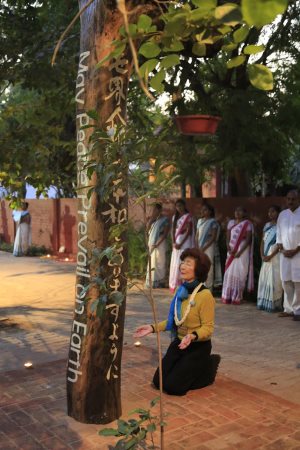 The next morning, Yuka from Japan relayed a touching update on her mother, Masami Saionji, a spiritual leader from Japan whose lineage has dedicated their whole life to praying for world peace. Despite fragile health, Masami-san traveled from Japan to India just to spend a few hours with the Gandhi 3.0 family. Over the past few months, Masami-san received strong intuition to intensify her already fervent prayer for world peace, given the precarious conditions around the world. The intensity of the spiritual penance meant that she was sleeping only 3-4 hours per night for the past few months, severely affecting her health at her senior age. However, after being present through the 3-hour session, and being with the Gandhi 3.0 community, she received a deep assurance that the world is in good hands. For the first time in months, Masami-san slept for 10 hours straight that night.
The next morning, Yuka from Japan relayed a touching update on her mother, Masami Saionji, a spiritual leader from Japan whose lineage has dedicated their whole life to praying for world peace. Despite fragile health, Masami-san traveled from Japan to India just to spend a few hours with the Gandhi 3.0 family. Over the past few months, Masami-san received strong intuition to intensify her already fervent prayer for world peace, given the precarious conditions around the world. The intensity of the spiritual penance meant that she was sleeping only 3-4 hours per night for the past few months, severely affecting her health at her senior age. However, after being present through the 3-hour session, and being with the Gandhi 3.0 community, she received a deep assurance that the world is in good hands. For the first time in months, Masami-san slept for 10 hours straight that night.To build on these questions, we further probed, “Looking at the world at large today, what breaks your heart? What gives you hope? How are you amplifying the hope in your work?” The following day, we invited participants to share stories around, "How has your personal values and practices affected your work in the world?" As the deep dive continued, we huddled around the razor's edge of love and fear, skillfulness, transformation of consciousness, personal and group practices. We later asked ourselves, “As we return home, how can we internalize the values and implement the practices in our own life and work?”
WATERING THE SEEDS, WITH OUR JOURNEYS
All through our time together, guests were invited to share their journeys -- not just about what they do in the world but who they have become through the process.
Pavithra YS, at the age of 22, started a company with a simple rule -- she’ll hire anyone with disability who wants to work. A decade and 1400 employees later, she’s still going strong. “I remember once, a hearing impaired person came in for a job. I wrote down on a piece of paper, ‘How can we work together?’ She said, 'I teach you my language and you teach me the work.' Today, 40% of our employees are hearing impaired, and sign language is an official language.”
Yoav Peck, who brings together Israelis and Palestinians together for face-to-face conversations, shared his optimism for peace. “Do you think peace is possible in the Middle East?” “Yes, absolutely.” “How long?” “My grandson is up for the army in six years, so that’s how much time I’m giving myself.” “What gives you hope?” “Once, I was hospitalized next to a man named Yossi, a settler on West Bank. Surprisingly, I found a friend in him, and eventually he came to one of our “Sulha” gatherings. There he befriended a Palestinian brother, Ahmed. As they parted ways, Ahmed says: ‘In a couple of months, Yossi, you're going to be in uniform and armed, out at the roadblocks, and I will still be across the road, throwing stones at you soldiers. Please, man, be careful out there!’ That gives me hope.”
As the soil gets richer and intertwined with each other’s humanity, so do the stories we tell.
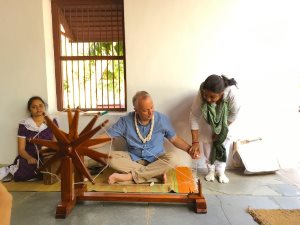 Alfred Tolle was the former CEO of a company that sold for $17B, but he chose to tell a formative story from early teen years: "I was 13 when my father passed away. And I remember, still, being in the emergency room and having an experience that was beyond time and space. I can never forget that. I realized, then, that we can do anything, create any reality we want." Anu Aga, similarly, spoke candidly about losing her husband and her son in a span of two years, and being thrust, all of a sudden, into a role of business woman. She ultimately found her grounding through meditation, but wondered, “Must we really wait for an encounter with death to wake up?”
Alfred Tolle was the former CEO of a company that sold for $17B, but he chose to tell a formative story from early teen years: "I was 13 when my father passed away. And I remember, still, being in the emergency room and having an experience that was beyond time and space. I can never forget that. I realized, then, that we can do anything, create any reality we want." Anu Aga, similarly, spoke candidly about losing her husband and her son in a span of two years, and being thrust, all of a sudden, into a role of business woman. She ultimately found her grounding through meditation, but wondered, “Must we really wait for an encounter with death to wake up?”With great wit, Jerry White, a Nobel Peace Laureate with Princess Diana, spoke about his journey of losing a leg to a landmine accident and helping many others along the way. Milan Rai, an artist from Nepal, humorously narrated how he came to make butterfly installations across the world. Galia Tyano Ronen poetically held a paradox between service to others and compassion for self. Bharat-bhai, who runs a Naturopathy center, recalled growing up with Vinoba Bhave, a man who changed the face of modern India without leaning on financial capital.
Sehr Karim offered a sneak peek into her experiments at her mom’s chain of nail salons in Dubai. “For Ramadan last year, I asked several hundred of our staff if they wanted to practice giving. And 100% of them said yes! We decided to give free services to maids and nannies of our clients. Initially there was a lot of resistance within the company, but all the front-line therapists happily volunteered, the clients were thrilled, and the beneficiaries were elated beyond words. No money was involved, and yet so much value was created!”
Given that everyone in the group was a “doer”, often at tremendous scale, by afternoon of the first day, many publicly shared their enthusiasm, “How can we connect and work together? We can do so much. How do we bring this spirit of love back home?” By the fourth day, Hawaiian elder, Aunty Kehau, shared a terrific bit of her indigenous wisdom: “What we are all feeling here, this isn’t something that we can pack and take home. We have to grow it in your heart, plant it in your kin, and give it time and space to bloom at its own pace.”
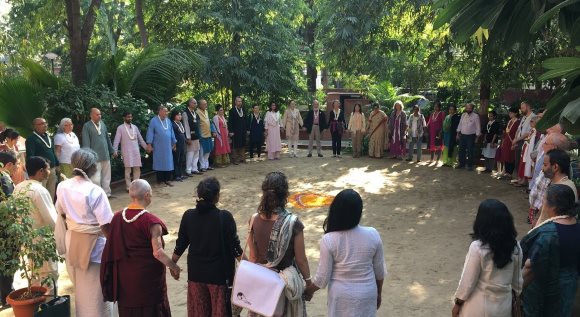
HONORING THE SUN, BY TUNING INTO THE PRESENT
"Isn't it amazing, that the sun rose this morning?" In his Japanese accented voice, and trademark smile, this was Shin Terayama. If you stayed with him for 5 days, you would know that this is an 82-year-old man with unending joy for the tiniest aspects of life. Birds chirping, humans being kind, sun rising.
In the smallest things around us, all our inquiries were vividly alive. One could see many-to-many networks forming organically, the untiring mind of 30 volunteers constantly in the flow, gentle holding of a wide spectrum of opinions and world views, multiple forms of immense wealth from stories, songs, and talents, and, of course, the nonstop practice of unrelenting generosity.
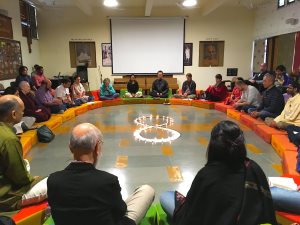 In his vintage style, Joserra joked that "mobius is the new obvious." Mobius strip is a mathematical shape, found in many places in our daily lives, like the conveyor belt of an airport baggage claim or the belt under the hood of our cars. If you plant your pen on a mobius strip, and keep tracing it forward, you would sometimes be on the inside and sometimes on the outside. And that is a great metaphor, not only for the fusion of inner and outer work, but also for the configuration of the circles we inhabit. Sometimes we are facing inside-out, sometimes outside-in.
In his vintage style, Joserra joked that "mobius is the new obvious." Mobius strip is a mathematical shape, found in many places in our daily lives, like the conveyor belt of an airport baggage claim or the belt under the hood of our cars. If you plant your pen on a mobius strip, and keep tracing it forward, you would sometimes be on the inside and sometimes on the outside. And that is a great metaphor, not only for the fusion of inner and outer work, but also for the configuration of the circles we inhabit. Sometimes we are facing inside-out, sometimes outside-in.Everything about our retreat was mobius. We had old people and young. Men and women. Established leaders and budding youngsters. Very affluent people and those without a bank account, even. Very strong opinions, often contradicting with each other. In theory, such diversity sounds appealing, but such mobiosity can only be held if there is a strong undercurrent of oneness. On Day 5, one of the prominent personalities among us openly shared in the circle, "Today, I want to say I’m sorry. For years, I’ve closed my heart with judgement toward one among you." Looking straight at the person now: "I should’ve checked with you first. I realize now that I was mistaken." This transformation came without any 1-on-1 conversation. It simply emerged in the field of our shared love.
To step up the “mobiosity” even further, we held two community nights where we invited 250 friends from across India to step into the emerging field. Beloved kin like Sister Lucy, Awakin Circle hosts from various cities, business and community leaders, and everyday heroes.
On the first night, Nimo and Trupti orchestrated a terrific evening at the Gandhi Ashram, with a talk by Gary on Universal Human and another one by Masami on the Gift of Prayer. All participants had prepared an intricate hand-drawn prayer mandala as a gift for Japan. Here is a video tribute to Masami-san's lifelong work of praying for peace on earth.
Fourty young children shared an electric performance about the life of Gandhi. Love was in the air. Similarly, on the second night, Nisha and Joserra invited 9 participants to share their stories, songs and performances in our outdoor amphitheatre, as we ended with a swaying hug while singing “opening wider circles”.
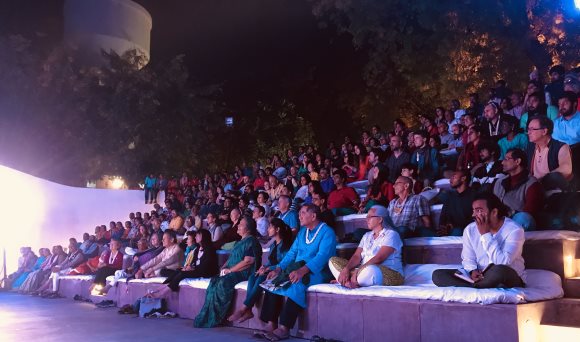
BUILDING DEEP ROOTS, WITH CONSTANT KINDNESS
Many aspects of the retreat felt awe-inspiring, but none more universally confounding than the crew of 30 volunteers. "Where does one find such volunteers?" Even more than the quantity of the effort, what moved everyone was the space from which they operated and cooperated with each other. Prior to the retreat, at the volunteer orientation, they set the collective intention clearly: serve without an off switch, without seeking, and without sensational feedback. And one has to say, they succeeded in spades.
Such service yields constant kindness. And constant kindness makes way for deep roots.
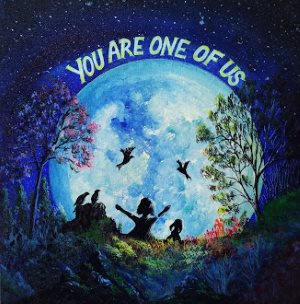 Alyssa, at one point, mentioned her favorite quote by Bill O’Brien: "The success of an intervention depends on the interior condition of the intervenor." Someone overheard it, told someone else, and someone else. And by the end of the day, Alyssa had a hand-drawn bookmark on her bed with that quote. In one of the circles, a participant spoke affectionately about how five words have lighted his journey: "You Are One of Us." On the last day of his trip, another volunteer hand-painted this remarkable piece and left it in his room. And sometimes, the gifts are simply the stories we get to hear. Listening to reflections on relationships, at Meghna's Awakin Circle, Lijo wondered about his decisions as a commander in the Indian Navy.
Alyssa, at one point, mentioned her favorite quote by Bill O’Brien: "The success of an intervention depends on the interior condition of the intervenor." Someone overheard it, told someone else, and someone else. And by the end of the day, Alyssa had a hand-drawn bookmark on her bed with that quote. In one of the circles, a participant spoke affectionately about how five words have lighted his journey: "You Are One of Us." On the last day of his trip, another volunteer hand-painted this remarkable piece and left it in his room. And sometimes, the gifts are simply the stories we get to hear. Listening to reflections on relationships, at Meghna's Awakin Circle, Lijo wondered about his decisions as a commander in the Indian Navy.While at Seva Café, one of the speakers was a young leader from North Dakota -- Greg Tehven. "My wife is my hero of invisible service. She runs a flower shop in our hometown of Fargo, with a mission of spreading love and kindness. She’s about to deliver our first child in 6 weeks, and without her invisible sacrifices, I wouldn’t be here today." By the end of the night, some volunteers crafted a sign that read, "Thinking of you, Christy" and our group of sixty friends took a photo. By morning, a video had made its way to her inbox, as Greg quickly got her email response: "I feel so surrounded by love and joy thousands of miles away! So much so, that it brought me to such joyful tears. The baby can definitely feel the love as it has been kicking more than ever! This kindness certainly will not be forgotten, as you sure made this girl's day!" And then she added a personal comment to Greg, "If they’re treating a stranger like me with so much love, I can only imagine what you must be experiencing."
Those stories by itself are heart-opening, but it is the deep roots that generate a lasting effect.
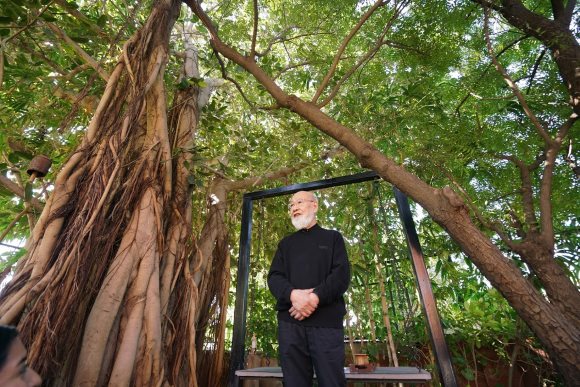
That same night at Seva Cafe, for instance, a young man was serving us delicious "pani-puri" dinner. "How long have you been volunteering here?" (Seva Cafe is a gift-economy restaurant, that runs with the support of volunteers.) "9 years." "Really? How old are you?" "18 years." "So, you’ve volunteered here half your life?!? How often do you volunteer here?" "For the last year, it’s been daily." "Daily?!? What brings you here?" "It’s the people, the love, and the kindness we spread."
It's hard to pinpoint exactly how that kid's 9 years affects the pani-puri, that affects the space in which we all met, that affects how Greg spoke about his wife, that affects how someone thought of "tagging" her with an act of love, that affects how she responded to tears thousands of miles of away, that affects the consciousness of the world. It's hard to pinpoint how all that interconnects, but after 10 days of Gandhi 3.0, you develop a hunch that it somehow does.
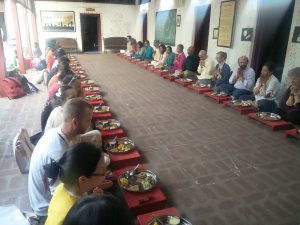 It shows up as "slow stories", the kind that marinate in one's being and feel utterly incomplete when seen on an Instagram feed.
It shows up as "slow stories", the kind that marinate in one's being and feel utterly incomplete when seen on an Instagram feed.Meghna, for instance, was our co-emcee for the whole retreat. Apart from her incredible designs that are anonymously present all over the world, as Danny Lopez and Cherie Montoya shared, she is also an anchor for slow stories. Including her own. During the immersions, when she hosted a special Awakin Circle, she shared, "As a typical, starving college student, we used to drink coffee to kill our hunger. One day, we stumbled into a circle in California -- and the host fed us with so much love, even without knowing anything about us. We returned next week. And the next, and next. Soon, it became a habit. Meditation became an integral part of our lives. And I decided that one day, whenever I have my own home, I will host Awakin Circles. So it was. For the last 11 years, every Wednesday, we’ve held these circles. Welcome."
No matter where one glanced, transformations rested on such layered reservoirs of slow stories. Hence, everything felt grounded in a very different way.
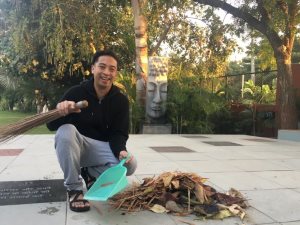 During one of our immersion activities, we hand-made some brooms. Lobsang Phuntsok, featured in Emmy Winning film Tashi and the Monk, said he’s going to place the broom on his altar, next to the Buddha. “Sweep clean, inside and out.” And Bonnie, a pastor from Southern California, chatted with the man who taught us how to make those brooms. An elder in his 70s, she learned that he had spent 11 years living in a public toilet, and had then dedicated his life to breaking the social and mental barriers around sanitation in India. Very moved, she asked her translator, “How do I show my respect?” “In India, we touch the feet of elders as a sign of respect and a request for their blessings.” So Bonnie did that. Later she reflected, “That was one of the highlights of my trip.”
During one of our immersion activities, we hand-made some brooms. Lobsang Phuntsok, featured in Emmy Winning film Tashi and the Monk, said he’s going to place the broom on his altar, next to the Buddha. “Sweep clean, inside and out.” And Bonnie, a pastor from Southern California, chatted with the man who taught us how to make those brooms. An elder in his 70s, she learned that he had spent 11 years living in a public toilet, and had then dedicated his life to breaking the social and mental barriers around sanitation in India. Very moved, she asked her translator, “How do I show my respect?” “In India, we touch the feet of elders as a sign of respect and a request for their blessings.” So Bonnie did that. Later she reflected, “That was one of the highlights of my trip.”At the Gandhi Ashram, we all prayed on the prayer ground. When the Dalai Lama last visited, he asked his organizers to cancel all his plans and sat there in silence for 4 hours. Similarly, Masami-san told us, with very vivid confidence, “Gandhi’s essence is still alive here, but we must learn how to receive it and then share it.” Soon after, we inaugurated a Peace Pole at the Gandhi Ashram. Yet again, the pole was wrapped in a slow story that’s been brewing for several generations. In what felt like a remarkable marvel of serendipity, with so many monastics and spiritual leaders from so many spaces all gathered in one manifest circle, Masami-san led a collective prayer: May Peace Prevail on Earth.
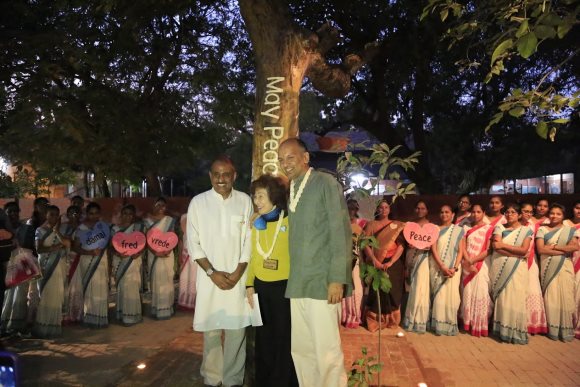
Indeed, as Aunty Kehau shared earlier, the sun isn't meant to be packed in our suitcase and carried home. Instead we can work on ourselves, so the clouds of our mind part way and the sun can reveal itself.
HARVESTING THE FRUITS OF LOVE
The tranquil campus of the Environmental Sanitation Institute is sprinkled with many insightful quotes and beautiful art. Perhaps the most frequent quote -- and a most fundamental principle of the Gandhian ecosystem -- is this: "Whatever the question, love is the answer."
In a way, the entire Gandhi 3.0 retreat is a practice of that axiom. From midnight welcomes at the airport, to hand-drawn name tags and notebooks, the practice of unconditional love is made palpable in the most mundane details.
Shaheen Mistri, founder of the massive Teach for India effort, underscored the power of small acts in one of the evening talks: “I’ve been connected to this community for 20 years now. I remember, years ago, I took a bunch of kids to Jayeshbhai. They took off their flip-flops hastily and raced indoors. Jayeshbhai casually lined them up. The next day, the kids did it again, and Jayeshbhai quietly lined them up again. Third day, the kids lined them up themselves. No explanation, no lecture, no threats. Just being the change. Patience, borne of a big heart.”
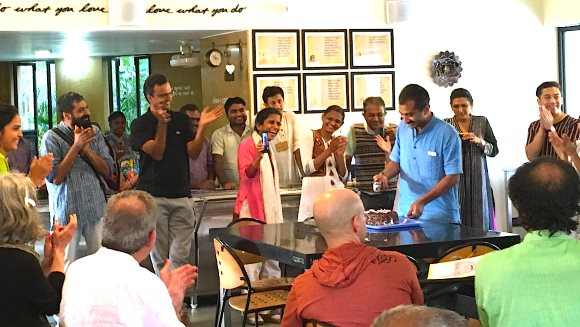
In the end, we all silently bowed around the campus. Three steps and a bow. In gratitude, in reverence, in inexplicable joy. Beyond words.
“I cried at every bow,” Linda said. Galia “felt a spectacular alignment”, leading to an intent of doing 3-steps and a bow on the Israel-Palestine border and installing a Peace Pole. Yoav added, “I've never bowed in my life, but I figured if I'm going to break that inner wall, these are the people to do it with, this is the place, and now is time. It was genuinely transformative." Cherie said of her experience, “I started by praying for health of people I know and love, but soon my prayers organically morphed into an amorphous wish of well-being and it flowed to people I didn’t even know, to everyone.”
Each, in our own way, felt nourished by love’s harvest. It’s ripples will be countless.
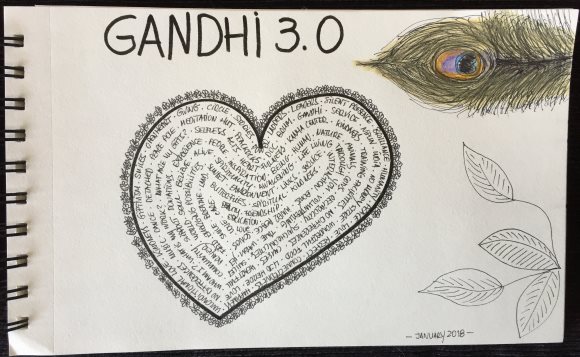 In just a week, from the Philippines, Ana Valdes Lim commented on a blog post: "Intellectually, I always knew the fountain was within, but I didn't realize such power until Gandhi 3.0. Now, I want to live no other way. The shift transaction to transformation is like volunteering to have your false self completely exploded. Nothing remains but love." To bring this spirit to India’s corporate sector, Anu has teamed up with a few others to do a similar “CEO Retreat”. For her Church Congregation in America, Bonnie has initiated a blog series to write one retreat reflection everyday for 40 days. Luthier Fabrizio Alberico was gifted some wood from a tree at the Gandhi Ashram, whose small chips he’s going to include in all his future guitars. Galia has set the March dates for Karma Kitchen in Israel. Aslinur already hosted an Awakin Circle in Istanbul, while Vasco joined one in Lisbon. Jerry wrote, from Washington D.C., "Our loving-kindness-drenched time together without agenda at Gandhi 3.0 retreat reminded me of Denise Levertov’s poem -- an energy field more intense than war." On Facebook, Ujwal posted, “My first turning point of life came when I went into banking sector in 1974. Second came when went into social sector as CEO of Pratham, and now I believe a third point turning point of my life has arrived.” In Portugal, Maria offered a peacock feathered art, with the caption: “The spirit of the retreat is merging into every single cell of my body. When words fail, I sketch.”
In just a week, from the Philippines, Ana Valdes Lim commented on a blog post: "Intellectually, I always knew the fountain was within, but I didn't realize such power until Gandhi 3.0. Now, I want to live no other way. The shift transaction to transformation is like volunteering to have your false self completely exploded. Nothing remains but love." To bring this spirit to India’s corporate sector, Anu has teamed up with a few others to do a similar “CEO Retreat”. For her Church Congregation in America, Bonnie has initiated a blog series to write one retreat reflection everyday for 40 days. Luthier Fabrizio Alberico was gifted some wood from a tree at the Gandhi Ashram, whose small chips he’s going to include in all his future guitars. Galia has set the March dates for Karma Kitchen in Israel. Aslinur already hosted an Awakin Circle in Istanbul, while Vasco joined one in Lisbon. Jerry wrote, from Washington D.C., "Our loving-kindness-drenched time together without agenda at Gandhi 3.0 retreat reminded me of Denise Levertov’s poem -- an energy field more intense than war." On Facebook, Ujwal posted, “My first turning point of life came when I went into banking sector in 1974. Second came when went into social sector as CEO of Pratham, and now I believe a third point turning point of my life has arrived.” In Portugal, Maria offered a peacock feathered art, with the caption: “The spirit of the retreat is merging into every single cell of my body. When words fail, I sketch.”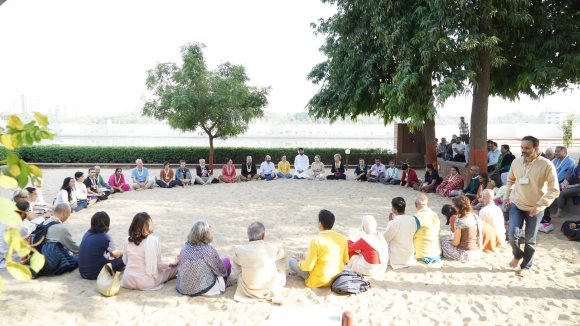
Via a thoughtful post upon reaching Turkey, Marian concluded, “Nine days after returning from India, I am still full with all these experiences of loving kindness and generosity of the heart. Having been given so much, I sense a natural urge to pay it forward implanted in my heart, and that is probably the biggest gift I have received: I have been filled to the brim so that I can practice giving from a place of infinite gratitude and abundance.”
CERTAINLY NOT A PERIOD
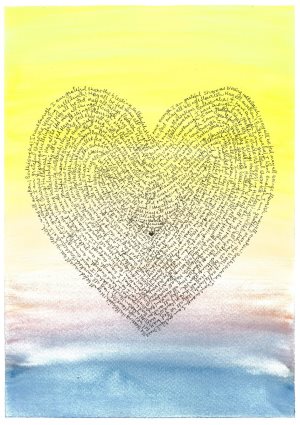 The grand rehearsal of unconditional love has concluded. A comma, a question mark, and an exclamation point, but certainly not a period.
The grand rehearsal of unconditional love has concluded. A comma, a question mark, and an exclamation point, but certainly not a period.By coming together with a trust in emergence, we co-created a field of love. With our questions, we tilled the soil. By telling our stories of transformation, seeds were watered. Listening into our layered context, rays of sunlight nourished us. Through the practice of constant kindness, our roots deepened and intertwined with each other. Spontaneous synergies manifested effortlessly. And ultimately, we found our individual pockets far too small to hold the harvest. The rich bounty will have to flow forward -- in ways that we perhaps can’t even imagine yet.
Just like that, plausible felt possible again. Our experiments with Law of Love surge on with added momentum. We take “delight in life, delight in the scheme of this universe”, over and over again. Truly, it is in giving that we receive, and in togetherness that we walk each other home.
------
Thanks to the untiring and brilliant media team volunteers, here is a video tribute to the indescribable Gandhi 3.0 retreat!
And here is a photo album of some highlights from our time together :)
Posted by Zilong Wang on Feb 4, 2018
SHARE YOUR REFLECTION
31 Past Reflections


On Feb 4, 2018 Rahul Brown wrote:
1 reply: Donatella | Post Your Reply

On Feb 4, 2018 Dinesh Mehta wrote:

On Feb 4, 2018 Sheetal Vaidya wrote:



On Feb 4, 2018 Vasco wrote:

On Feb 4, 2018 Maria Daniel wrote:

On Feb 4, 2018 Myron Eshowsky wrote:


On Feb 4, 2018 Aryae Coopersmith wrote:

On Feb 4, 2018 Thu Nguyen wrote:

On Feb 4, 2018 Kozo Hattori wrote:

On Feb 5, 2018 Yoav Peck wrote:

On Feb 5, 2018 Preeta Bansal wrote:

On Feb 7, 2018 Alfred wrote:

On Feb 10, 2018 Dilip P Patel wrote:

On Feb 11, 2018 Viral Mehta wrote:

On Feb 13, 2018 Ariel Nessel wrote:

On Feb 14, 2018 Pancho Ramos Stierle wrote:

On Feb 20, 2018 Giang Dang wrote:

On Feb 23, 2018 trushna wrote:

On Oct 2, 2018 Akhil wrote:
Such a powerful experience. Thank you for taking the time to prepare this.
All my love.

On Oct 3, 2018 Bonnie Rose wrote:

On Oct 4, 2018 Deepak Sethi wrote:

On Oct 11, 2018 David wrote:

On Oct 29, 2018 Ronnie Dunetz wrote:

On Nov 7, 2022 Barbara Schwartzbach wrote:

On Feb 13, 2023 Carl M. wrote:

On May 19, 2023 Madel Smith wrote:



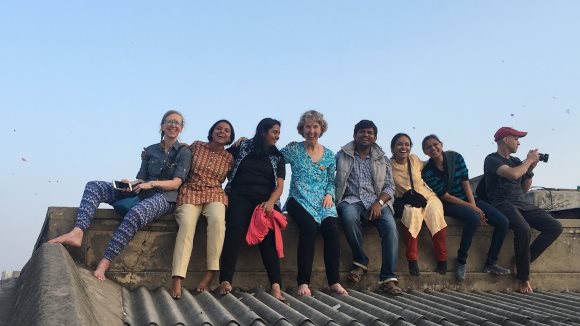
On Feb 4, 2018 Marian Brehmer wrote:
Post Your Reply